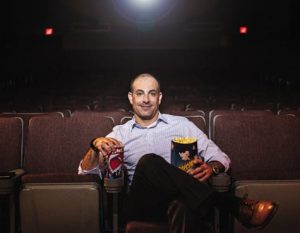As Evan Miller settles into the role of Greater Cleveland Film Commissioner, Cleveland Magazine sat down with him to discuss what’s next for the Cleveland industry and the GCFC under his leadership. ORIGINAL ARTICLE HERE
Originally Published: November 14, 2019
Cleveland Magazine • Lee McKinstry

Photo: Michael McElroy
Evan Miller is ready to lead the Commission’s ambitious plan to make filmmaking a permanent Ohio industry.
Cleveland Magazine:
You’d like to eventually expand the Ohio Motion Picture Tax Credit to a permanent, annual $100 million. Why?Evan Miller: First, thankfully, the tax credit also includes [traveling] theater productions. That loops in our vibrant theater community across the state. But it boils down to, we need to show the Hollywood community and producers that there’s value here. When you get people here to work, they see it in our people, they see it in the cost of living. But initially, these productions want to know how they can save money. If we can offer a competitive tax incentive, we’ll be in position where we don’t have to turn anyone down for that reason. The reality is $40 million doesn’t go very far.
CM: Some states have eliminated tax credits due, supposedly, to lack of return on taxpayer investment. Why is it still important for Ohio to have one?
EM: As we continue to build infrastructure, we look at having long-term stability, which is the goal. You get a series here — I can’t speak to other states’ success — but where you see states like New Mexico and Georgia, they’re successful in not only harnessing people and the incentive, but then also building an infrastructure that made it a lot easier for studios to want to be there.
CM: Is a series the goal?
EM: The most consistent production is obviously TV, if you have something that shoots 10 to 20 episodes. With over 500 shows produced in the last year, and that number going up, there’s no reason that at least one can’t be here. That creates consistent work over several months. In this business, it tends to snowball. If you get one series here that has a great experience, others want to come. It’s really about creating that long-term production that’s going to keep people in Cleveland working longer and ultimately make them more prosperous.
CM: What does the film industry offer to Cleveland that other industries don’t?
EM: It’s work that ranges from people who are more artistic to people who are contractors. Outside of that very wide net it casts for all different ages, skill sets and experiences, it also tends to be something where you can make more money than a lot of other industries. The money people earn as they get going is very competitive, and can really set people up to be successful, and in turn keep the city successful.
CM: What’s your vision for the Commission?
EM: The mission of this organization is to use the media industry to grow economics and jobs in the city. I think the tax incentive is a great way to accomplish that. [It’s] working with our strategic partners within the city and state to showcase the value of what we’re doing, getting people excited, and then building on the infrastructure that Ivan built, because he’s definitely set up this organization and the state to do well in the future in this industry. We want to pick up that torch and keep running with it.
CM: What are you enjoying most about being back in Cleveland?
EM: Family. And I’m not gonna lie, being back in my sports teams’ town. I got tired of being the visiting fan for so long out in LA. You feel good when you’re not alone walking down the street in a Cleveland Browns shirt.